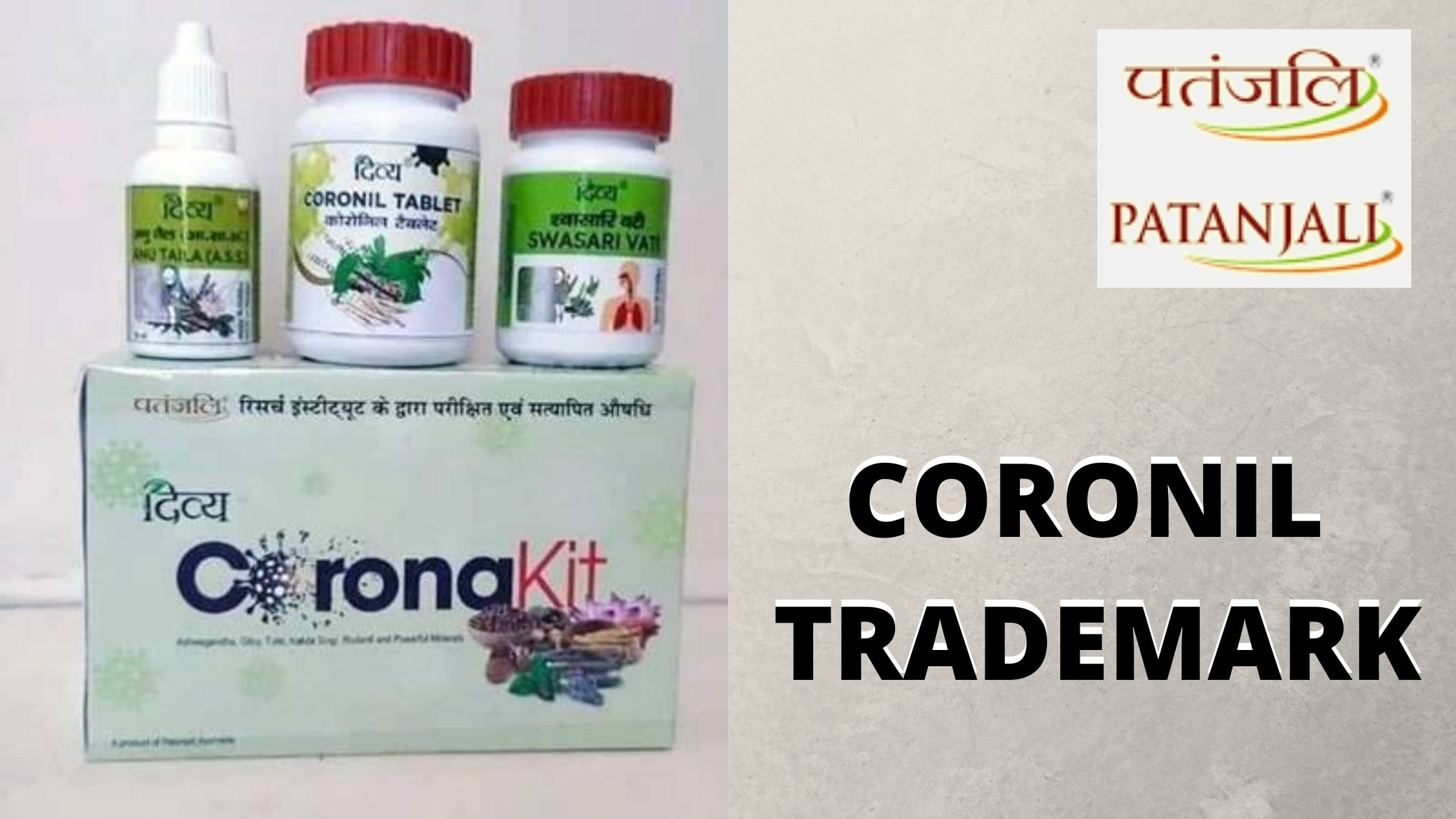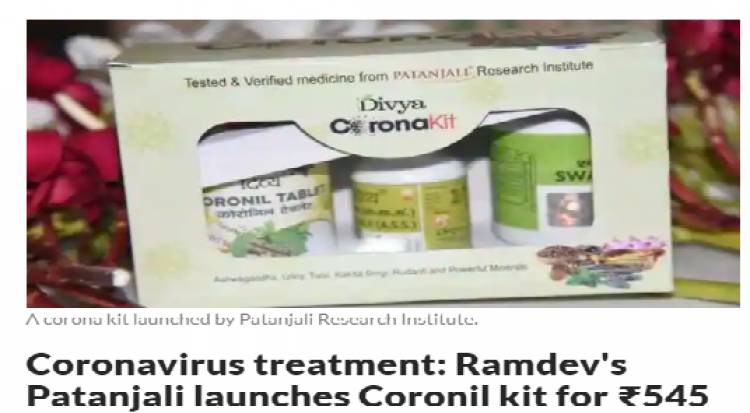The Case of ‘Coronil’ Trademark
The year 2020 saw an unprecedented world event with the Covid-19 pandemic. A viral infection that originated in Wuhan, China, quickly spread to the entire world, causing drastic measures to be taken in every country to prevent the spread of the virus. Curfews were imposed, countries were locked down, and a year into the pandemic, it’s become completely normal to see people wearing masks everywhere. Work on a vaccine began as soon as possible, and we are finally at the point where a vaccine is being administered to healthcare workers and high-risk people in some countries.

The year 2020 saw an unprecedented world event with the Covid-19 pandemic. A viral infection that originated in Wuhan, China, quickly spread to the entire world, causing drastic measures to be taken in every country to prevent the spread of the virus. Curfews were imposed, countries were locked down, and a year into the pandemic, it’s become completely normal to see people wearing masks everywhere. Work on a vaccine began as soon as possible, and we are finally at the point where a vaccine is being administered to healthcare workers and high-risk people in some countries.
During the peak of the pandemic, many companies released medicines that claimed to help the body fight the Covid-19 virus. These medicines were sold as immunity boosters, with the aim of strengthening the body’s immune system and making recovery easier if a person did contract Covid. One such medicine was launched in India by Patanjali, branded as Coronil.
There were some dubious claims relating to this medicine made by Patanjali, but that is not the focus of this article. After the medicine was launched, a trademark infringement case was filed against Patanjali by Arudra Engineering Pvt. Ltd. in the Madras High Court.
a. The plaintiff was the registered owner of the trademarks ‘Coronil-92 B’ and ‘Coronil-213 SPL’, like industrial chemicals
b. The plaintiff sued the defendant with regard to Section 29(4), claiming that it had a reputation to uphold
c. The plaintiff also advanced the argument that the inefficacy of the ‘Coronil’ medication would serve as a blow to their reputation
d. The main defence was on the grounds that the two products were in completely different categories
AVOID TRADEMARK INFRINGEMENT BY CONDUCTING TRADEMARK SEARCH, SEE THIS VIDEO -
Initial Judgement
The court declared that since the defendant themselves rebranded ‘Coronil’ from being a cure for Covid to a simple immunity booster, there is no link between the tablet and the Coronavirus, and hence no reason for the defendant to use the name ‘Coronil’. As such, the use of such a name by the defendants is without due cause and is taking unfair advantage of the term which has already been trademarked by the plaintiff. Sinch such undue advantage is specifically prohibited under Section 29(4)(c) of the Trade Mark Act, the defendant should be prohibited from using the name ‘Coronil’.
Under Section 29(4) of the Act, trademark protection is granted even to goods in different classes. The only prerequisite is that the plaintiff’s mark should have a reputation in India. The court here defined the standard that should be applied to interpret the phrase “reputation in India”. According to this judgement, the phrase means just that, nothing more and nothing less. A mark does not need to be a well-known mark to have a “reputation in India”. In the present case, the court pointed out that there are very few heavy industries in the country, and if even a few of them are aware of the plaintiff’s mark, that would satisfy the condition of the mark having a “reputation in India”. However, after this decision, an interim stay was issued on this order by a Division Bench of the Madras High Court.
Analysis
The order of the court which placed an injunction on the use of the brand ‘Coronil’ by Patanjali relied mainly on the interpretation of the term “reputation in India” used in Section 29(4) of the Trade Mark Act.
This entire case was instituted by the plaintiff because they feared that the use of the name by the defendant would dilute the value of their brand, and protection against such dilution in India is given under Section 29 of the Act.
As mentioned earlier, the court interpreted the phrase “reputation in India” to have a lower threshold than that of the “well-known mark” (the threshold for this phrase is laid out in detail in Section 11(6) of the Act)
However, according to section 11(2), which provides for relative grounds for rejection of a trademark, a trademark cannot be registered if it is similar to an earlier trademark which is a well-known mark
Therefore, this interpretation of the High Court in the Coronil case can give rise to a situation where if a claim is brought against a trademark under Section 29(4), the standard of proof will be lower than if a claim is opposed before registration under Section 11(2)
This creates an inconsistency in the law, and may promote bringing infringement claims under section 29(4) after the offending mark has been registered, rather than opposing its registration under section 11(2).
This inconsistency can be resolved if both “well-known marks” and “marks with a reputation” are treated with the same standard
Another major point in the decision by the Court was determining the reputation of the plaintiff.
According to the court, since the size of the industry to which the plaintiff belonged was small, the product only needed to be familiar to a small number of members of that industry to have a “reputation in India”.
Here, a situation has arisen where a trademark in a specialized industry has a much smaller burden of proof for showing a reputation than a trademark in more general industry, and the plaintiff has got an advantage because of this situation.
A major argument advanced by the defendant was that the plaintiff’s industry was too small and specialized, and therefore there would be very little chance of dilution as most customers will not draw a mental link between the plaintiff’s product and the defendant’s tablets.
This need to show a mental association was emphasized by the Supreme Court in ITC v. Philip Morris. Here, the Court had held that if a reasonable buyer is not likely to think of the infringed trademark at all while buying the infringing trademark, there can be no dilution.
This question has not been adequately answered by the Court in the present case.
The final decision of the Madras High Court is still pending, and hopefully, the Bench will address some of the questions and inconsistencies mentioned in this article and clarify the position of Indian trademark law on this matter.
BY -
Shivalik Chandan














